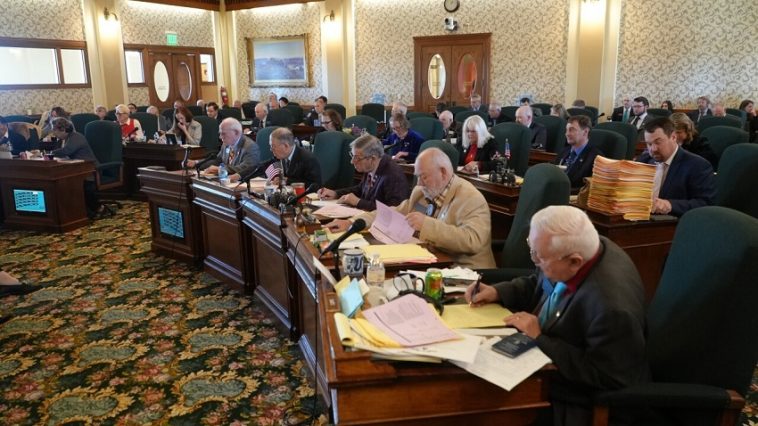Missoula, MT – With the Montana legislative session nearing its final stretch, lawmakers are scrambling to push through key pieces of legislation before Saturday’s critical deadline. Any bill affecting state revenues must pass either the House or Senate by the end of the day to remain alive, prompting a flurry of activity in both chambers.
One of the most closely watched votes came Friday afternoon when the Senate rejected Senate Bill 543, a proposal to allow candidates for judicial offices to use political party labels. The bill was defeated by a 27-22 vote, with nine Republicans joining all 18 Democrats in opposing the measure.
This marks the latest in a series of attempts to change Montana’s nonpartisan judicial election system. Proponents of the bill argued that partisanship is already present in the judiciary, and voters deserve to know candidates’ political leanings. Senator Jeremy Trebas (R-Great Falls) expressed support for the bill, claiming judges often make decisions based on political biases.
“Judges aren’t neutral; they make decisions on a political basis,” said Trebas. “The current system hides that from the voters.”
However, opponents warned that introducing party labels would undermine the independence of the judiciary and erode public trust in the legal system. Senator Shane Morigeau (D-Missoula) voiced concerns that voters want decisions based on facts, not political ideology.
The debate over partisan judicial elections has divided lawmakers, with the House rejecting similar proposals in recent weeks, including a vote against Senate Bill 42, which would have implemented party primaries for all judicial races. House Speaker Rep. Brandon Ler (R-Savage) is sponsoring House Bill 838, a bill that mirrors Senate Bill 543 and will need to pass the House in the coming week to stay alive.
In addition to the judicial election debate, the Senate advanced Senate Bill 561, which would restructure the Montana Public Service Commission (PSC). The bill, introduced by Senator Daniel Zolnikov (R-Billings), proposes reducing the number of elected commissioners from five to two, while the governor would appoint three commissioners with expertise in fields like law, energy, and finance. The appointments would require confirmation by a two-thirds vote in the Senate.
Zolnikov argued that the change would bring much-needed expertise to the PSC, which regulates utilities such as electricity, gas, and water in Montana. “In almost every state, regulatory bodies are populated with experts who understand the issues,” Zolnikov said. “How many qualified individuals are going to run for office to become a commissioner?”
However, opponents of the bill, including Senate President Pro Tem Ken Bogner (R-Miles City), raised concerns that the proposal would reduce public control over the PSC and give more power to the executive branch. “This would weaken the voice of voters and shift control away from the people,” said Bogner.
Another key piece of legislation making its way through the Legislature is Senate Bill 537, which would alter how marijuana tax revenue is distributed in Montana. The bill, also sponsored by Zolnikov, would direct a portion of marijuana revenue toward law enforcement agencies, drug and alcohol prevention programs, and the state’s behavioral health system, while maintaining existing allocations for conservation programs like Habitat Montana. The bill is aimed at addressing gaps in state funding for public safety and health services.
Meanwhile, the House moved forward with House Bill 932, which similarly expands the scope of the Habitat Montana program to include wildlife crossings over highways and additional conservation projects.
With the legislative session winding down, the Montana Legislature has passed more than 900 bills, and lawmakers have just 24 legislative days remaining. As the deadline looms, both chambers are working diligently to finalize and pass bills that will shape the state’s policies for years to come.
As the clock ticks toward the end of the 2025 legislative session, Montana’s lawmakers remain focused on a variety of high-stakes debates, from judicial elections to regulatory reform and the future of marijuana revenue distribution. Only time will tell which of these proposals will make it across the finish line.



